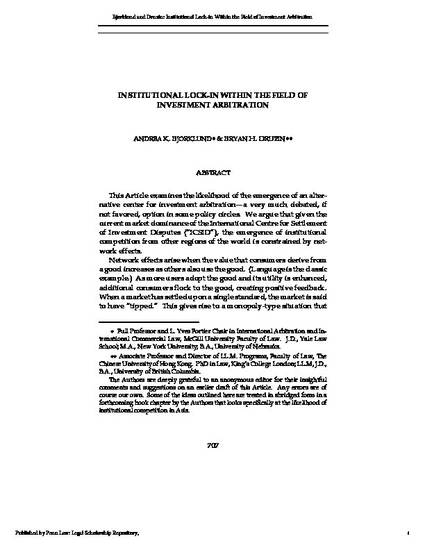
Article
Institutional Lock-in Within the Field of Investment Arbitration
University of Pennsylvania Journal of International Law
(2018)
Abstract
This Article examines the likelihood of the emergence of an alternative center for investment arbitration—a very much debated, if not favored, option in some policy circles. We argue that given the current market dominance of the International Centre for Settlement of Investment Disputes (“ICSID”), the emergence of institutional competition from other regions of the world is constrained by network effects.
Network effects arise when the value that consumers derive from a good increases as others also use the good. (Language is the classic example.) As more users adopt the good and its utility is enhanced, additional consumers flock to the good, creating positive feedback. When a market has settled upon a single standard, the market is said to have “tipped.” This gives rise to a monopoly-type situation that prevents potential rivals from successfully challenging the market dominance of the prevailing standard, creating what is known as “institutional lock-in.”
After explaining the concept of institutional lock-in, we explore its salience in the investment arbitration realm. We find that this model is robust and its impact discernible in the current investment arbitration environment. Notwithstanding this finding, certain exogenous events could substantially reduce or even annihilate this effect. To this end, potential “disruptive events”—such as the European Union’s push for an investment “court,” potential competition from the Permanent Court of Arbitration (“PCA”) or other arbitration centers, and unforeseen legislative changes—are explored. These events could undermine the market dominance of ICSID and trigger either a large-scale coalescence around an alternative institution or, rather more likely, the parceling out of investment arbitration among multiple competitors until the market again coalesces around a new standard. However, we conclude that in the absence of a strong exogenous shock, the institutional lock-in of ICSID will be difficult to dislodge.
Keywords
- ICSID,
- Dispute arbitration,
- Network effects,
- institutional lock-in
Disciplines
Publication Date
Fall September, 2018
Citation Information
Andrea K. Bjorklund and Bryan H. Druzin. "Institutional Lock-in Within the Field of Investment Arbitration" University of Pennsylvania Journal of International Law (2018) Available at: http://works.bepress.com/bryan_druzin/30/
